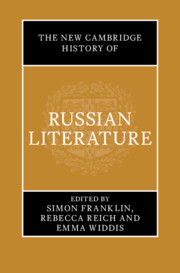Book contents
- The New Cambridge History of Russian Literature
- The New Cambridge History of Russian Literature
- Copyright page
- Contents
- Figures
- Contributors
- Acknowledgements
- On Transliteration, Names, and Dates
- Introduction
- History 1 Movements
- History 2 Mechanisms
- 2.1 The Monastery
- 2.2 The Court
- 2.3 The Salon and the Circle
- 2.4 The Thick Journal
- 2.5 The Publisher
- 2.6 Queerness
- 2.7 The Censor
- 2.8 The Voice
- 2.9 The Self-Publisher
- 2.10 The Market
- 2.11 The Internet
- 2.12 Empire
- Boxes 3 Places
- Boxes 4 Narrative Voices
- History 3 Forms
- History 4 Heroes
- Index
- References
2.8 - The Voice
from History 2 - Mechanisms
Published online by Cambridge University Press: 31 December 2024
- The New Cambridge History of Russian Literature
- The New Cambridge History of Russian Literature
- Copyright page
- Contents
- Figures
- Contributors
- Acknowledgements
- On Transliteration, Names, and Dates
- Introduction
- History 1 Movements
- History 2 Mechanisms
- 2.1 The Monastery
- 2.2 The Court
- 2.3 The Salon and the Circle
- 2.4 The Thick Journal
- 2.5 The Publisher
- 2.6 Queerness
- 2.7 The Censor
- 2.8 The Voice
- 2.9 The Self-Publisher
- 2.10 The Market
- 2.11 The Internet
- 2.12 Empire
- Boxes 3 Places
- Boxes 4 Narrative Voices
- History 3 Forms
- History 4 Heroes
- Index
- References
Summary
This chapter argues that the spoken word had special significance in the Russian literary tradition due to censorship and other constraints on the printed word, and also because of the cultural chasm between a small, educated elite and a weakly literate majority. It begins with Baroque rhetoric in the eighteenth century before examining the role of oral performance and rhetoric in the Romantic era. It then shows a reinvigoration of literature’s oral dimension from the reform era of the 1860s through to the early twentieth century, as writers became public readers of their work and the educated elite sought to render a popular ‘voice’ in literary form. Following a repressive hiatus in the Stalin period, the spoken word had its heyday in the postwar era: guitar poetry, a popular form of urban folklore, entered the field of literature, while poets achieved national fame as performers as well as published authors.
- Type
- Chapter
- Information
- The New Cambridge History of Russian Literature , pp. 353 - 368Publisher: Cambridge University PressPrint publication year: 2024

